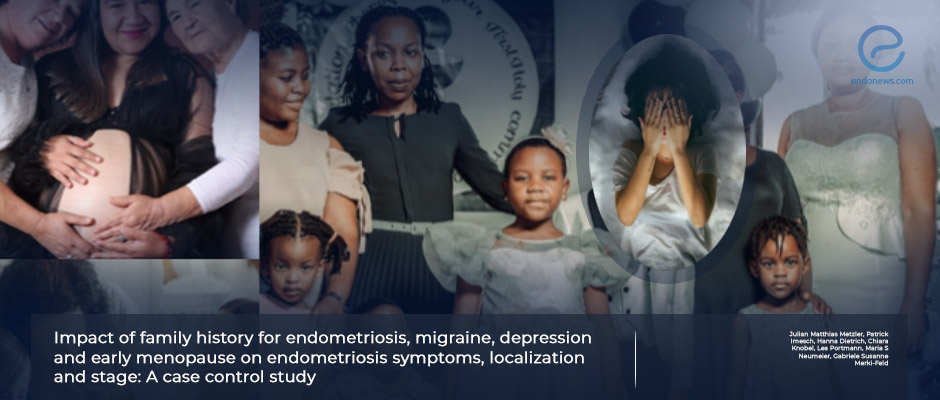Family history of endometriosis and its characteristics
Jan 10, 2024
Clinical characteristics of the disease differ in women with a family history.
Key Points
Importance:
- Little is known about the relation of family history for endometriosis and its influence on the severity or clinical presentation of the disease.
Highlights:
- Family history is found in one-tenth of the women with endometriosis,which is associated with advanced stage disease and more endometriomas, women with a family history for depression had earlier disease stage and respond better to oral contraceptives, and women with a family history for migraine respond less to hormonal contraceptives.
What's done here:
- This observational case-control study was conducted in a tertiary clinic in Switzerland on women with surgically and histopathologically confirmed endometriosis.
- Based on patient records and phone interviews, the relations between a family history for endometriosis, migraine, depression or early menapause and endometriosis signs and symptoms were compared on 334 patients.
- Endometriosis was classified according to rASRM classification, whereas pain was scaled from 1 to 3.
Key Results:
- Family history of endometriosis was reported in 10% of the women. Family history of migraine (33%) , depression (33%) or early menopause were reported 10%.
- Patients with positive familial stories were slightly older, and those with positive early menopause stories (>46 years of age) had their first surgery for endometriosis at a younger age.
- Patients with family history of endometriosis had advanced stage disease and more endometriomas.
- The presence of family history of depression was linked to earlier disease stage and less endometriomas, but increase risk of both migraine and depression, and showed a better response to hormones.
- The patients with a family history for migraine were less responsive to hormonal contraceptives.
- Familial early menopause patients reported more and severe dysmenorrhea and had more than five days of non-cyclic pains.
- A familial history of endometriosis did not show an association with a positive familial migraine. Also, a positive familial migraine was not associated with a positive familial history of early menopause.
Lay Summary
Depression and migraine are two familial disorders affected by menstrual cycle and endometriosis patients have an increased likelihood of suffering from these comorbidities. A correlation of endometriosis, migraine and depression has been already reporteed in the literature, however a link for their familial history is not clear.
Metzler et al. from the Department of Gynecology of University Hospital Zurich, Switzerland, planned a observational case-control study with the aim to investigate if a positive family history for endometriosis, migraine, depression or early menapause might be associated with clinical symptoms or endometriosis stage by enrolling women with histologically confirmed endometriosis in their tertiary endometriosis center. This interesting study was published in December 2023 issue of the European Journal of Gynecology and Reproductive Biology.
Surgical findings, patient records and phone interviews were evaluated and the relations between a family history for endometriosis, family history for migraine, family history for depression or early menopause and clinical signs and symptoms of endometriosis such as response to combined hormonal contraceptives, analgesics, disease localization, infiltration depth, Enzian- and rASRM-scores were compared on 334 patients.
Family history of endometriosis found 10%, family history of migraine in 33%, family history of depression in 33% and the family history of early menopause were in 10%. Patients with family history of endometriosis had advanced stage disease and the presence of endometriomas was more likely.
The presence of family history of depression was linked to earlier disease stage and less endometriomas, but these patients had increased risk of both migraine, however thet showed a better response to combined hormonal contraceptives. On the other hand, the patients with a family history for migraine were less responsive to hormonal contraceptives. Familial early menopause patients reported more and severe dysmenorrhea and had more than five days of non-cyclic pains.
The presence of a familial history of endometriosis did not show an association with a positive familial migraine. Also, a positive familial migraine was not associated with a positive familial history of early menopause.
The authors drew attention to the differing symptoms and surgical findings of endometriosis in patients who have familial history, migraine, depression, and early menopause and mentioned that their results underscore the importance of routinely gathering family history by clinicians. "This proactive approach not only facilitates early diagnosis and attentive patient follow-up but also enables the development of tailored treatment plans, ultimately enhancing patient care and improving outcomes for individuals living with endometriosis", they added.
Research Source: https://pubmed.ncbi.nlm.nih.gov/38103542/
family history migraine depression early menopause rASRM scores combined contraceptives analgesics infiltration depth endometriosis.

